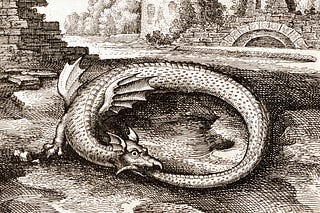Odyssey: The Archetypal Yearning for Home
Rediscovering our origins on the path of individuation
“While the Trojan war can be seen as an outgoing, a leaving of one’s house in the morning and going out into the arena and tumult of life, the journey narrated in The Odyssey represents a return, a coming back to where one started.”
— Edward Edinger, The Eternal Drama: The Inner Meaning of Greek Mythology
“I am without home, in every aspect of life, it seems. And so, where do I belong? Where do I find stability, contentment, rest? I want to return home, but where is that?”
Over the last 5+ years, I have contemplated these questions. By my own hand, of my own volition, I untethered myself from what rooted me. First, it was my full-time job; I left it behind without a clear idea of what exactly I would do next. I heard the call, felt the trueness of it in my bones, and stepped out into the chaotic, creative world of self-employment.
I left a longtime relationship, one that was deeply intertwined with a social group, a sense of family, and “home”. I cast myself into the darkness of unknowing, at once exiled and liberated. It was terrifying, activating a sense of danger like I had never experienced before. And yet, I felt free.
I moved briefly to a quiet home in Joshua Tree, surfed couches and extra bedrooms in the Bay Area, spent over a year in the high desert of Sedona, hiking, camping, drinking in the dark sky. No place felt like my own, each was occupied on borrowed time. Eventually, I had to reckon with the instability all of these choices had built up. How long can one go without feeling like they can build a foundation, dig deep, call a space their own?
And then, there was the greatest act of uprooting through it all. My inner world, the psychic landscape so full of potentials, uncertainties, shadows, unexplored territory. I was voraciously pulling apart what I had known, who I was, where I came from, where I was going. This, I came to understand, was the supreme destabilizer. Flinging open the doors to the unconscious, beckoning it to come forward, to show me more, had the effect of deteriorating structures of ego like nothing else I had known.
“I want to feel at home in myself,” became the pervading mantra, one that I held so tightly, as the guiding light through it all.
A theme emerged through this time: I am on an odyssey. I have been called away, I’ve ventured far and wide, and yet, there is a yearning to return that I cannot deny. I feel it inwardly as without. It colored my thoughts, the felt perceptions in my body, the creative projects I developed during that time.
Like Odysseus, I had to meet each challenge on the return journey. I found myself at times lingering in places too long. Bewitched by Calypso’s song, indulging in the fruit of the lotus, struggling to navigate the underworld and its shades — these trials taught me where my blind spots were and pointed towards the resources I needed to claw my way out.
Each move taken back towards a place of ease was helpful; settling into my work, deciding where I was going to live, etc. It got me one step closer, but only in a shadowed way. There was always something else below the surface that I had to understand if I truly wanted to arrive.
A Return to Origin
“Consciousness does not create itself – it wells up from unknown depths. In childhood it awakens gradually, and all through life it wakes each morning out of the depths of sleep from an unconscious condition. It is like a child that is born daily out of the primordial womb of the unconscious.”
— C.G. Jung, Psychology and Religion (CW 11)
I came to realize that the great archetypal yearning for home was meeting the reality of what was within me; it was walking the arduous and winding path of inner work and individuation. The return to origin that I so longed for was not a stable home or well-paying job (although the benefits of those cannot be understated). It was the settling into my psychic environment, the developing of a relationship with the unconscious forces that gave rise to my very being.
Where we were raised, the people who shaped us, the land itself — these are all dynamic, beautiful pieces of the journey. Revisiting and reconciling with them has a powerful healing effect. But what is it like to truly be at home within oneself, to stand at the foot of the arms of the great mother, that is, the unconscious in all its creative and destructive glory?
To come to know this matrix from which we were all born is an incredible gift, a homecoming like no other. It solidifies a cohesive sense of self that can weather the storm, come what may. No enchanting sirens can draw you from the course when the inner voice reverberates with a truer melody. We are less likely to face the scorn of an instinctual archetypal force (Poseidon) if we are maintaining the dialectic between conscious and unconscious.
The original state of undifferentiated wholeness is not the goal. Through the process of living, we are changed. Forever altered, we carry scars and burdens we never did before. It is a crucible of sorts, an increased heat and pressure that reveals new shape to our psyche and spirit. Each encounter is an opportunity to claim a new part of self, integrate something lost, cultivate a powerful essence.
The return is not paradisal. Standing in the gardens of the unconscious, walking the halls, resting for a while in bed — these are momentary homecomings that recharge our life force. We are meant to venture out once again, clash against the environment, and harvest the riches that come from being truly in oneself as well as out in the world.
In this sense, the odyssey never ends, just as the process of individuation is never over. When home and origin are most fundamentally seen as the relationship to our psychic depths, there is a clear locus of control. We can choose to meet our shadows with greater openness. We can navigate our dreamworld and decipher its deeper meaning. We can balance the limited viewpoint of our ego with the abundant resources from within.
Although many parts of my life feel unsettled, as if I’m still lost on the great sea voyage, I also have a sense of peace like never before. When the waves start to threaten, when I’m feeling unanchored, I come back to the origin, to the center within, and I feel at home.
Join the conversation
What does "home" mean to you? Is it a physical place or something more?
Do any other archetypal themes, motifs, or images come up when you consider home and origin?
What parts of The Odyssey align with your path of individuation and inner work?
This article is inspired by my upcoming event at Philosophy Portal (run by ) where I will be presenting on the archetypal themes of home and origin. The platform offers opportunities for foundational philosophical discourse and deeper understanding of an array of psychoanalytic topics.



















Wow, Alyssa. Such a beautiful and profound post. It was also wonderful to learn more about your personal story. I can tell that it's not simply an intellectual understanding you share, but rather one that comes through your own lived experience. The archetypal theme of home has been constellated for me these past couple years, and has been "sneaking" its way into my poetry. Curiously I just read the Odyssey not that long ago. Seems timely as I begin to enter Midlife and my Uranus-Opposition. Everything you wrote really resonates with me. Thank for that.
Home is a home-coming to Self and Mystery. And, for me, more recently, I have been feeling called to connect to my Ancestors. Perhaps this belongs more to the theme of belonging.
Thanks again, Alyssa. Beautiful post!
Man, I felt every bit of this. Beautifully written. My world was shaken from its foundation around five years ago too and my sense of “home” changed forever. I finally started living a life awake and making a home within myself for the first time. 💛